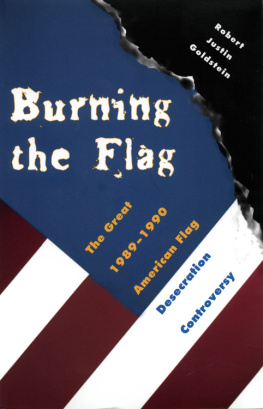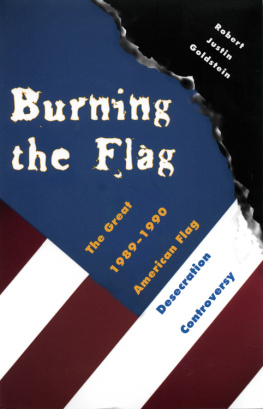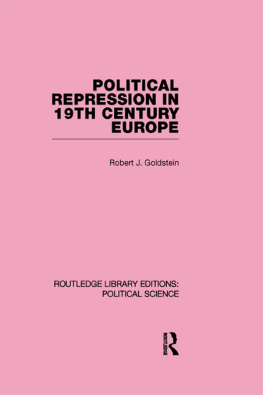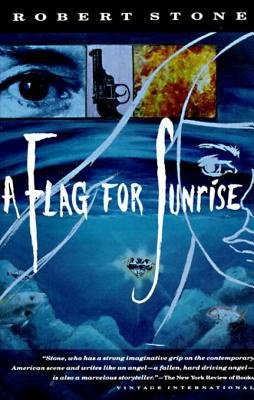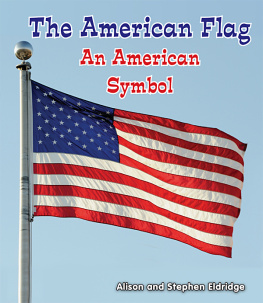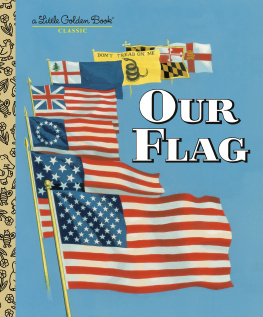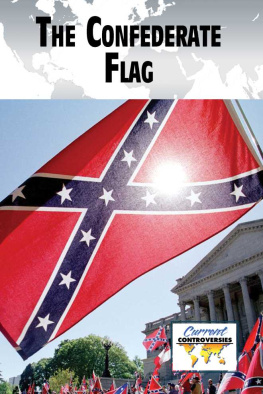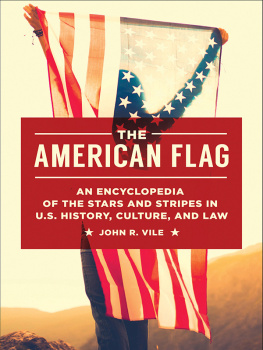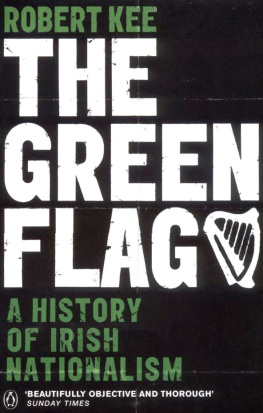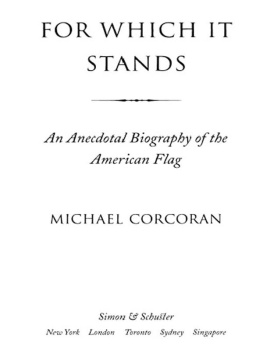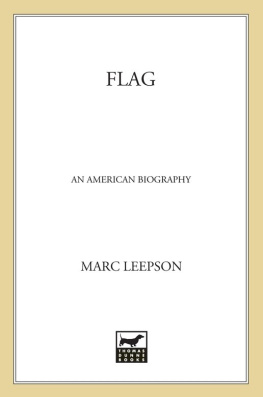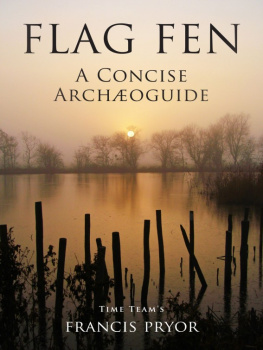1996 by The Kent State University Press, Kent, Ohio 44242
All rights reserved
Library of Congress Catalog Card Number 95-5541
ISBN 0-87338-526-8
ISBN 0-87338-598-5 (pbk.)
Manufactured in the United States of America
02 01 00 99 98 97 5 4 3 2
First paperback printing
Library of Congress Cataloging-in-Publication Data
Goldstein, Robert Justin.
Burning the flag : the great 19891990 American flag desecration controversy / Robert Justin Goldstein.
p. cm.
Includes bibliographic references and index.
ISBN 0-87338-526-8 (cloth)
ISBN O-87338-598-5 (pbk.)
1. FlagsDesecrationUnited States. I. Title.
| CR113.G568 1996 | 95-5541 |
| 929.920973DC20 | CIP |
British Library Cataloging-in-Publication data are available.
Petris account summed up the depths and ultimate uncompromisability of the dispute that raged in American society and politics in 1989 and 1990 in the aftermath of the Johnson decision. Like a small minority of his fellow Republican congressmen and a clear majority of Democratic congressmen, Petri attempted to satisfy both sides of the dispute: in 1989 he voted in favor of the Flag Protection Act (FPA) of 1989, which Congress passed in an attempt to override the Johnson ruling, while in 1990, he voted against a Bush administration-backed constitutional amendment designed to accomplish the same ends after the Supreme Court struck down the FPA in its June 11, 1990, U.S. v. Eichman decision.
In the end, the right to desecrate the flag for purposes of political protest was theoretically legally established (although, as will be pointed out in this books epilogue, anyone attempting to exercise this right in practice still faced a high chance of being prosecuted for something), and the flag and the country continued to exist more or less as before. But the year-long political focus on this purely symbolic issue unquestionably contributed to the same failure of the nations leaders to address the countrys real problems which had fostered the very climate of general national uncertainty and insecurity that had originally fueled the massive negative reaction to the Johnson ruling (a subject that is discussed at some length at the end of this book).
As many readers will already have detected, I believe that the Supreme Court decided the flag desecration issue correctly in 198990. So that all readers can be fully alerted to detect and discount my biases, I believe that it is important to set out my own views on this contentious subject. From one perspective, the 198990 flag desecration controversy was surely one of the greatest examples of much ado about nothing in American, if not world, history. The United States was not over-run with mobs of flag burners in the 1980s; as the Tampa Tribune pointed out on June 28, 1989, You are likely to live a lifetime, and never see a dissident burn a flag, except on television where such events are greatly welcomed. All we know about flag-burners is that they are microscopically few and seriously deficient in public-relations skills. Furthermore, there is no evidence that flag desecration threatens the flags symbolic value. Indeed, the reaction to the Supreme Courts Johnson ruling suggests that from the standpoint of promoting patriotism and mass flag waving, both verbal and actual, Johnsons contribution was virtually unprecedented (and certainly unheralded).
Although tolerating flag desecration is hardly likely to threaten the flags symbolic value (or anything else), forbidding flag burning as a means of peaceful political protest will surely diminish the flags symbolic ability to represent political freedom. As Professor Arnold Loewy has written, Perhaps the ultimate irony is that Johnson has done more to preserve the flag as a symbol of liberty than any prior decision, while the decisions detractors would allow real desecration of the flag by making it a symbol of poltical oppression. Although the particular incident involving Johnson was isolated and ultimately insignificant, the principle represented by the Supreme Courts decision was absolutely fundamental to the core values of a political democracy: the right to vigorous, vehement, and even highly offensive and upsetting peaceful dissent from government policy. As Justice William Brennan summed up this key point in his Johnson opinion, If there is a bedrock principle underlying the First Amendment, it is that the Government may not prohibit the expression of an idea simply because society finds the idea itself offensive or disagreeable. Or as the late Supreme Court justice Robert Jackson declared in a 1942 case (in which the Court outlawed compulsory flag salutes and recitals of the Pledge of Allegiance in public schools), in what remains probably the most eloquent and apposite paean to democratic principles ever penned by the Court:
Those who begin coercive elimination of dissent soon find themselves exterminating dissenters. Compulsory unification of opinion achieves only the unanimity of the graveyard. The case is made difficult not because the principles of its decisions are obscure but because the flag involved is our own. Freedom to differ is not limited to things that do not matter much. That would be a mere shadow of freedom. The test of its substance is the right to differ as to things that touch the heart of the existing order. If there is any fixed star in our constitutional constellation, it is that no official, high or petty, can prescribe what shall be orthodox in politics, nationalism, religion or other matters of opinion.
As Justice Jackson suggests, much of the controversy over the Johnson ruling came not from the principles at issue but because it involved the flag, and the flag involved is our own. No serious claim would likely be made that it should be unlawful for an opponent of the 1991 American war with Iraq to burn a newspaper copy of President George Bushs explanation for this policy. Although ultimately any flag is simply a piece of cloth or other substance with colors or designs imprinted on it, many Americans have clearly invested this fabric with highly emotionally charged values. But, again to quote Justice Jackson, A person gets from a symbol the meaning he puts into it, and what is one mans comfort and inspiration is anothers jest and scorn. If there is to be any meaning to freedom of expression in the United States, it can only be that if President Bush can wave the flag as he sends troops to Panama or Iraq, then dissenters can protest that action by burning the flag. As the great civil libertarian scholar Alexander Meiklejohn has written, the true meaning of freedom of expression is that if

